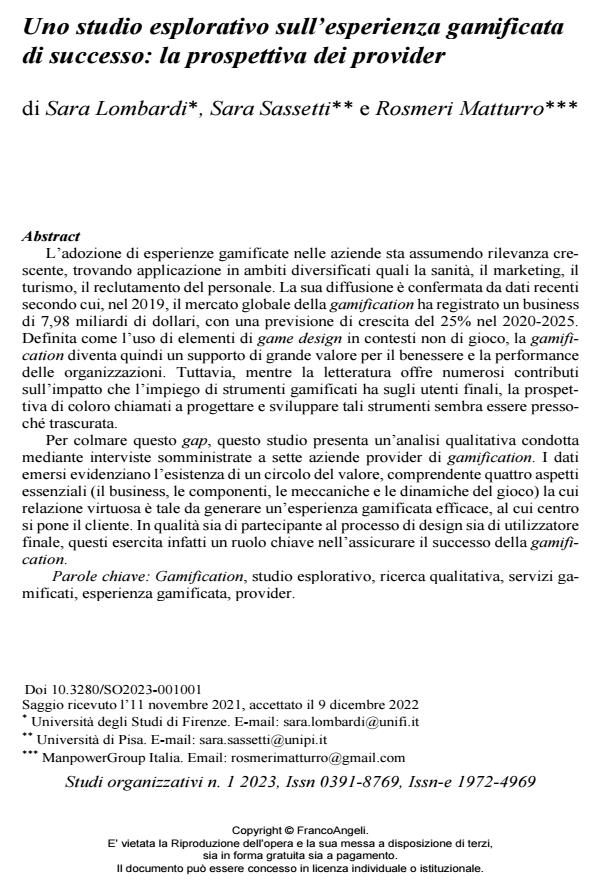Uno studio esplorativo sull’esperienza gamificata di successo: la prospettiva dei provider
Titolo Rivista STUDI ORGANIZZATIVI
Autori/Curatori Sara Lombardi, Sara Sassetti, Rosmeri Matturro
Anno di pubblicazione 2023 Fascicolo 2023/1
Lingua Italiano Numero pagine 24 P. 9-32 Dimensione file 287 KB
DOI 10.3280/SO2023-001001
Il DOI è il codice a barre della proprietà intellettuale: per saperne di più
clicca qui
Qui sotto puoi vedere in anteprima la prima pagina di questo articolo.
Se questo articolo ti interessa, lo puoi acquistare (e scaricare in formato pdf) seguendo le facili indicazioni per acquistare il download credit. Acquista Download Credits per scaricare questo Articolo in formato PDF

FrancoAngeli è membro della Publishers International Linking Association, Inc (PILA), associazione indipendente e non profit per facilitare (attraverso i servizi tecnologici implementati da CrossRef.org) l’accesso degli studiosi ai contenuti digitali nelle pubblicazioni professionali e scientifiche.
L’adozione di esperienze gamificate nelle aziende sta assumendo rilevanza crescente, trovando applicazione in ambiti diversificati quali la sanità, il marke-ting, il turismo, il reclutamento del personale. La sua diffusione è confermata da dati recenti secondo cui, nel 2019, il mercato globale della gamification ha registrato un business di 7,98 miliardi di dollari, con una previsione di crescita del 25% nel 2020-2025. Definita come l’uso di elementi di game design in contesti non di gioco, la gamification diventa quindi un supporto di grande valore per il benessere e la performance delle organizzazioni. Tuttavia, mentre la letteratura offre nume-rosi contributi sull’impatto che l’impiego di strumenti gamificati ha sugli utenti fi-nali, la prospettiva di coloro chiamati a progettare e sviluppare tali strumenti sem-bra essere pressoché trascurata. Per colmare questo gap, questo studio presenta un’analisi qualitativa condotta mediante interviste somministrate a sette aziende provider di gamification. I dati emersi evidenziano l’esistenza di un circolo del valore, comprendente quattro aspetti essenziali (il business, le componenti, le meccaniche e le dinamiche del gio-co) la cui relazione virtuosa è tale da generare un’esperienza gamificata efficace, al cui centro si pone il cliente. In qualità sia di partecipante al processo di design sia di utilizzatore finale, questi esercita infatti un ruolo chiave nell’assicurare il succes-so della gamification.
Parole chiave:Gamification, studio esplorativo, ricerca qualitativa, servizi gamificati, esperienza gamificata, provider.
Sara Lombardi, Sara Sassetti, Rosmeri Matturro, Uno studio esplorativo sull’esperienza gamificata di successo: la prospettiva dei provider in "STUDI ORGANIZZATIVI " 1/2023, pp 9-32, DOI: 10.3280/SO2023-001001